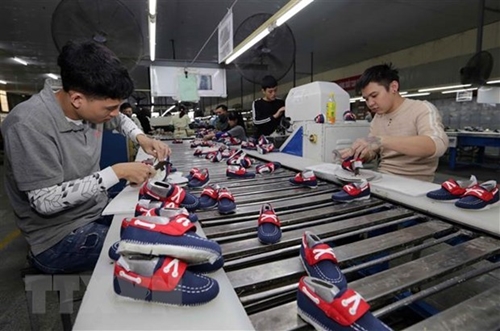The CPTPP, which took effect in Vietnam on January 14, gathers 11 member states, namely Australia, Brunei, Canada, Chile, Japan, Malaysia, Mexico, New Zealand, Peru, Singapore and Vietnam that altogether make up 13.5 percent of global GDP.
Ta Hoang Linh, Director of the European-American Market Department under the Ministry of Industry and Trade (MoIT), said Canada is one of the CPTPP members that have the highest market-opening commitments. Under this pact, it will cut tariffs on 95 percent of imports down to zero percent, and that covers 78 percent of Vietnam’s total export revenue to Canada.
    |
 |
|
The footwear factory of the Ha Tay Chemical Weave Co., Ltd. in Dan Phuong district, Hanoi |
This market is also one of the three CPTPP members with which Vietnam has not yet signed a bilateral trade agreement. Meanwhile, the two sides’ export structures do not compete with but are complementary to each other.
Therefore, if businesses can grab opportunities, the CPTPP will open the door wide for many processed and manufactured products which are Vietnam’s advantages like textile-garment, footwear, wood and aquatic products, Linh said.
Jared Brading, Counselor for Development Cooperation at the Canadian Embassy in Vietnam, said the CPTPP implementation will bring about more trade and investment chances, helping to strengthen trade partnership, especially in terms of agricultural and food products.
For Canada, this agreement will help reinforce relations with new free trade agreement partners like Vietnam and improve Vietnamese consumers’ awareness of Canadian goods, he said, noting his hope that Vietnamese goods will increase its presence in his country.
Brading added the CPTPP will also facilitate Canadian companies’ investment in and provision of technical support for Vietnam within the official development assistance framework so as to help local firms, especially those run by women, to benefit from trade liberalization and the CPTPP.
At the workshop, Nguyen Son Tra, an official from the MoIT’s Multilateral Trade Policy Department, said the enforcement of the CPTPP is considered a driving force for bilateral trade.
With the immediate elimination of 95 percent of import tariff lines after the deal took effect, which covers 78 percent of Vietnam’s exports to this market, Canada generates numerous export chances for Vietnam.
She elaborated all of Vietnam’s aquatic exports to Canada have benefited from a zero-percent tariff since January 14. The North American market has also reduced import tariffs on wooden furniture, tea, pepper and cashew nut to zero percent. It will remove all tariffs on textile-garment imports in the fourth year since the CPTPP came into force.
Meanwhile, 78 percent of Vietnam’s exports of footwear – another major foreign currency earner – to Canada have also enjoyed a zero-percent tariff immediately after the trade pact took effect.
Statistics show that in 2018, Vietnam shipped more than USD 3.01 billion worth of goods to Canada. Bilateral trade reached USD 379 million in January this year, including USD 317 million of Vietnam’s exports.
Source: VNA